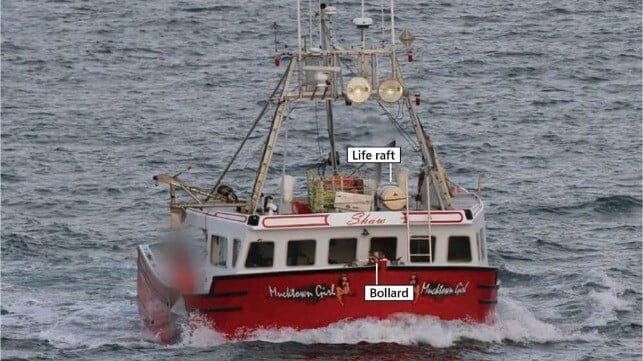Report: Poor Towing Plan May Have Contributed to Fisherman's Death

The Transport Safety Board of Canada (TSB) has concluded that a lack of planning may have contributed to the death of a fishing vessel crewmember during a rescue tow in severe weather two years ago.
The 42-foot fishing vessel Mucktown Girl and her crew of five were operating about 90 nautical miles off Canso, Nova Scotia on March 11, 2022 when they suffered electrical problems and total loss of power. The crew sent a distress call, and the Canadian Coast Guard dispatched the icebreaker Jean Goodwill and her crew of 25. When Jean Goodwill arrived at the scene some seven hours later, the master of the Mucktown Girl asked for a tow, and reported that there was no damage or other problems on the fishing vessel beyond the loss of power.
Because there was no damage to the vessel, the Goodwill's crew assessed that it was disabled, not in distress. It was the second time in five weeks that Mucktown Girl had called for a tow from the CCG, and rescue tows were a regular part of the Goodwill's duties.
A storm was incoming, and the master of the Mucktown Girl requested a tow at maximum speed to avoid the heavy weather. At 1000 hours on the 12th, the tow was rigged and they got under way for the harbor at eight knots. As was the custom, the crew of the Mucktown Girl remained on board as the vessel was towed.
Six hours into the operation, the bollard on the Mucktown Girl's bow broke off its welded baseplate, disconnecting the tow. This was unexpected, and there were no contingency plans to reestablish the tow or remove the crew from the fishing vessel. As the weather got progressively worse, and with no viable options for a safe transfer, the crew of the Mucktown Girl remained on the drifting vessel to ride out the storm. The two vessels remained in contact over VHF every hour, and Jean Goodwill held position a few miles off.
The storm intensified over the course of the day. By 2245, wind speeds on scene were about 50-55 knots and significant wave heights were about 30 feet. Mucktown Girl was now about 24 nautical miles off the coast, and drifting with the wind towards shore at about two knots. The Canadian Coast Guard rescue coordination center assessed that a wind shift would prevent her from grounding, and an evacuation was too risky except if absolutely necessary. Jean Goodwill stood by overnight, motoring ahead into heavy seas.
At 0605, the master of the fishing vessel reported that the boat was in danger of sinking. Jean Goodwill turned and made best possible speed towards the Mucktown Girl, rolling heavily in the swells. The icebreaker's aft working deck was awash with green water, and debris was floating freely about. A crew were sent out on deck to rig for rescuing personnel directly from the water - a task they had not done in a drill and were not fully equipped to do, possessing only a Jacob's ladder and a modestly-sized scramble net.
At 0650, the Jean Goodwill rolled through 30 degrees, injuring one crewmember on the bridge. On the aft deck, the icebreaker's chief officer was washed into the inner bulwark and severely injured. Several crewmembers narrowly avoided getting washed overboard.
Without advising the Jean Goodwill, the crew of the Mucktown Girl abandoned the vessel into their life raft and cut the painter, and their vessel sank behind them. When Jean Goodwill arrived, four crew members from the Mucktown Girl managed to board from the water, but one was swept away by a wave while trying to grab a Jacob's ladder rigged to the icebreaker's rail. His body was recovered by a CCG helicopter later in the day.
TSB faulted the Canadian Coast Guard for lacking a contingency plan for the tow in case something went wrong, and it described the crew's planning process as "naturalistic decisionmaking." Fishing boat tows were a normal occurrence in the area, and the fishing crew normally stayed aboard their vessel during a tow, so the Jean Goodwill used the same arrangement as always - even though a severe storm was coming and there was no safe way to get the crew off once it arrived.
“A plan for towing includes contingency plans for anticipated hazards such as heavy weather in open water or ice, and events such as a vessel taking on water or the towing arrangement breaking,” stated TSB. The investigators noted that when the bollard on the Mucktown Girl broke, there was no viable alternative towing point for a new towing arrangement.

that matters most
Get the latest maritime news delivered to your inbox daily.
Since the deceased fisherman was washed off just feet away from safety, the CCG reevaluated the rescue gear arrangements aboard Jean Goodwill, and it decided to equip the ship with a rescue scoop. It also changed out scramble nets on some of its vessels for an improved design.
TSB also noted that fishing vessels have a poor safety record compared to other vessel classes in Canada, and reiterated a longstanding call to action to improve conditions. "Every year, the same safety deficiencies and unsafe work practices on board fishing vessels continue to put at risk the lives of thousands of Canadian fish harvesters and the livelihoods of their families and communities. From 2018 to 2020, there were 45 fish harvester fatalities, which is the highest fatality count for a 3-year period in over 20 years," the agency noted.
